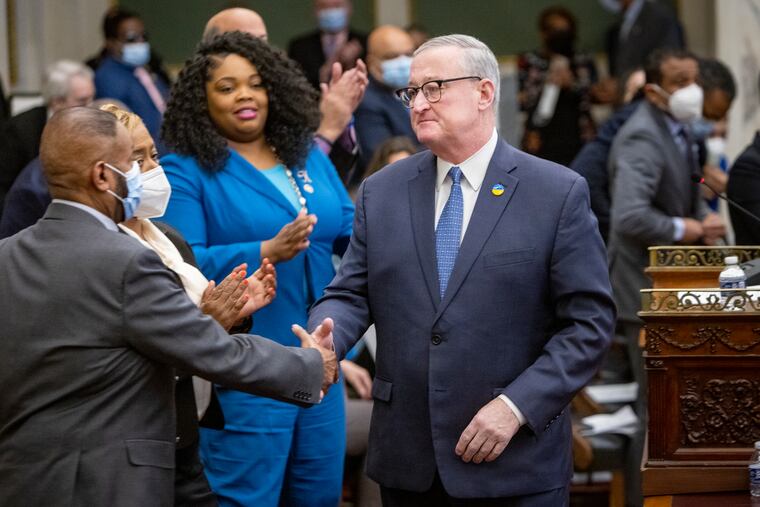Council is right to cut taxes and help spur economic growth | Editorial
The proposed reductions are a modest investment to attract businesses, not a significant decrease in the city’s ability to provide services.

In some ways, this year’s budget process for the city of Philadelphia represented continuity.
Mayor Jim Kenney and Council President Darrell L. Clarke, both of whom are in their final terms, funded many of their long-term priorities. Kenney, who has been a firm ally of city employees and retirees throughout his political career, has successfully narrowed the gap between what the city owes pensioners and what it has available to pay them. Clarke secured funds for quality-of-life and public safety interventions, such as removing abandoned vehicles and getting more cameras into the city’s rec centers.
In other ways, the budget reflects important — if still limited — change for a city that has seen stagnant job growth thanks to an onerous tax system and policies that are widely viewed as not being business-friendly.
Democratic mayoral nominee Cherelle Parker got a win through increased funding for PHL Taking Care of Business, her commercial corridor cleanup program, even though she’s no longer a member of City Council. On taxes, the most contentious line item, a rift between 2019’s “Freshman Four” took center stage, with at-large Democrats Katherine Gilmore Richardson and Isaiah Thomas supporting a slight reduction in wage and business taxes, and 3rd District Democrat Jamie Gauthier and at-large Working Families Party member Kendra Brooks in strong opposition.
Gauthier, who voted against advancing the budget, called it a “slap in the face to working-class, Black and brown residents.” For a chamber that has become known at times in recent years for its extreme collegiality, Gauthier’s strong words raised eyebrows. In a joint statement, she and Brooks dramatically compared the lower taxes to trickle-down economics, a reference to the large federal tax cuts under the Reagan, Bush, and Trump administrations. They also cited the relatively small size of savings for wage-earners and businesses.
Richardson and Thomas, however, are no Reaganites, and their proposed cuts represent a modest investment in Philadelphia’s economic growth, not a significant decrease in the city’s ability to provide services.
If anything, Richardson has established a reputation for fiscal prudence during her four years on Council. Her legislation to increase funding for the city’s rainy day fund is an important reminder that getting as much money out the door as possible isn’t always the best way to ensure high-quality city services. Richardson’s plan should boost the city’s credit rating, and lead to millions of dollars saved through reduced borrowing costs.
Additionally, these reductions have little in common with the massive federal tax cuts pushed by Republicans. Former President Donald Trump’s Tax Cuts and Jobs Act, for example, took federal taxes from nearly 39% for some corporations to a single corporate rate of 21% in one fell swoop. These cuts helped balloon the federal deficit, and according to the Congressional Budget Office, extending them would cost $3.5 trillion over the next 10 years. That’s about as much revenue as the federal government collected in all of 2021.
By contrast, the proposed reductions from Thomas and Richardson amount to about 0.5% of the city’s projected revenue, which is up by 4%, for the fiscal year. By comparison, the city spends about 15% of revenue on pension payments alone.
Cutting taxes slowly and prudently may not produce huge and immediate savings for taxpayers, but over time, these cuts can make a difference. Until 1995, Philadelphia charged residents nearly 5% in city wage tax. Under the proposal from Thomas and Richardson, that number is slated to hit 3.75%. That would represent the lowest figure for residents since the 1970s.
A recent survey by the Lenfest Institute for Journalism (which owns The Inquirer) found broad support for tax reductions, with Black, brown, and working-class residents more likely to back cuts than white residents and more affluent Philadelphians. Like Thomas and Richardson, these residents have not converted to Reaganomics. They simply recognize reality. High taxes hurt our local economy, our ability to compete for jobs with other cities, and our undercapitalized entrepreneurs.
Thomas’ office has cited research from respected local firms such as Econsult, which has projected that over time, these cuts will help grow city revenue by attracting businesses. That’s not based on “voodoo economics” — magically creating new businesses and growth through giveaways to the wealthy. It is based on the very real phenomenon of companies that already exist choosing not to operate in Philadelphia because of our uncompetitive tax system.
After all, it isn’t low tax rates that constrain city spending, but inadequate growth, high poverty, and low salaries. Philadelphia is relatively bereft of major corporations. Comcast, Aramark, and Crown Holdings represent the city’s only Fortune 500 companies. A sad feat for one of America’s major cities.
Decades of keeping taxes high and essentially shooing businesses away have led to stunted economic growth. Thomas, Richardson, and their Council colleagues are right to seek a different path.